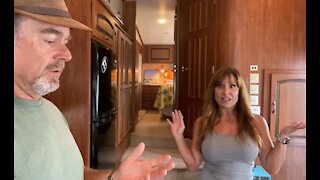Premium Only Content

10 Rules For Successful Real Estate Investing - Part 2
In a previous video, I covered the first 5 rules of successful real estate investing that I discovered through my personal experience and by speaking with successful real estate investors. If you haven’t seen that video, you will find it in the description below. Anyway, these rules reminded me what to do to thrive in good market cycles and navigate through the rough ones.
So, here are the last 5 rules for successful real estate investing:
6. Go Deep In Your Market
When you are considering a market, make sure it aligns with your overall goals.
Beginning with the end in mind means defining the number of units, revenue, or units under management at the beginning and working to acquire the properties in that area. Look at the overall health of the state, city, and neighborhood. Understand drivers to the local economy, job market, and population growth. Know the demographics and unemployment rates. These are all factors a sharp real estate investor knows to decide whether they want to be in the area.
Don’t make the mistake many investors, especially out-of-state investors, make: They see a nice, newly renovated property and its income, expenses, and asking price seem to look good. They end up acquiring the property without understanding the market. Often times, they are sold properties in D-Class or depressed areas at B-Class pricing. It would be better for them to either do the deep research to know that area, get on a plane and visit the area, or partner with an active investor in the area.
7. Invest in Multiple Markets
As we touched on in #6, different markets experience different cycles. With that said, you can reduce your risk by investing in three to five income-producing properties in multiple, performing markets. Of course, this number varies on how many units you are targeting in a given area.
So, how does this work? After you build your portfolio of strong income-producing properties in an area, move to another geographically diverse area with its own economic drivers. It would be best to move to a different state. You may consider investing in different asset classes to further reduce your risk. All this becomes easier when you have a team built out to help you manage the property online. Great property management is key. Watch my videos on building a team as it applies to doing the same thing in new markets.
8. Leverage Your Property Management Team
In my other videos, I’ve discussed the power of focus. Unless you are a property manager and you are very good at it, you shouldn’t be managing any of your deals. The more units you have, the more complex things become. Aside from servicing tenants, you need to manage the tactical nuances of daily operations. If you are trying to strategically grow your portfolio, it becomes difficult to provide the right attention to your properties. You want to focus on what you do best and remember why you got into this business in the first place: cash flow.
9. Be a Control Freak!
When I say to be a control freak, I mean that you need to control and run the asset effectively. You want to make sure that property is performing optimally and the people you have on your team have your back. The passive investors that put their money with you rely on your ability to make good decisions and get that deal to produce returns. This means you must work with your team to make that deal sing.
10. Leveraging Human & Financial Capital
The United States is one of the few places where you can leverage bank money up to 80% along with investor money to get into a deal. Using leverage can not only build wealth for you personally, but also provide great returns for your investors and stakeholders. This only works if you get into the right asset. Lean on your team of commercial banks, lenders, and operational support to make sure you are getting into a deal that you can comfortably sell to your stakeholders.
Anyway, that’s the second part of my 10 rules for successful real estate investing. Remember, as long as you have positive cash flow and operationally, the property is performing, you will be able to scale and grow your real estate business.
If you like the content, check out our podcast on iTunes and Stitcher and subscribe to the new YouTube channel. We are working on getting new content out all the time to help you build your success in the world of multifamily.
-
 4:25
4:25
bulletproofcashflow
4 years ago10 Rules For Successful Real Estate Investing - Part 1
103 -
 46:46
46:46
Cashflow Ninja
4 years agoMarco Santarelli Shares The 10 Rules of Successful Real Estate Investing
25 -
 2:36
2:36
bulletproofcashflow
4 years ago $0.02 earnedGetting Started in Multifamily Real Estate Investing
154 -
 1:05:51
1:05:51
Ask The Experts
4 years ago $0.02 earnedCommercial Real Estate Investing in America with Angela Olson
138 -
 14:35
14:35
Exoman
4 years ago $0.05 earnedReal Estate Investing Beach Home for Price of a Car
4094 -
 30:59
30:59
REIMastermindNetwork
4 years agoReal Estate Investing Tax Mitigation Strategies with Joshua Saunders
52 -
 16:55
16:55
MasterPassiveIncome
4 years agoStep-by-Step House Hacking to Start Investing In Real Estate
55 -
 0:15
0:15
flowphotos
4 years agoReal Estate Video
83 -
 0:48
0:48
chuckarelei
4 years agoreal estate ad
98 -
 0:53
0:53
ScottysThoughties
4 years agoReal estate agents
921